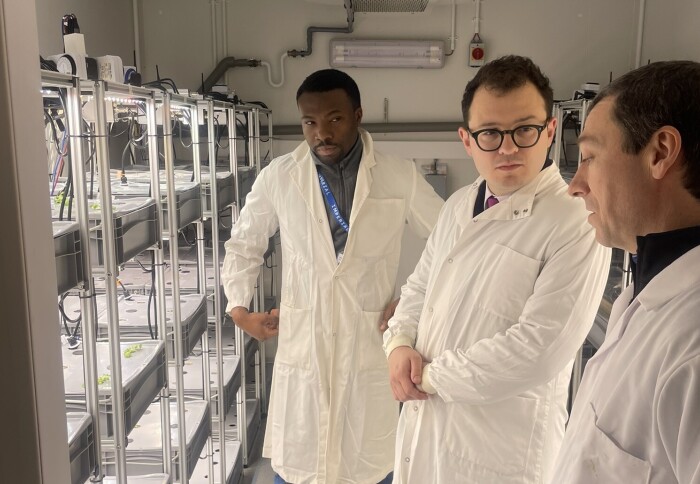Local Windsor MP sees biodiversity research at Imperial’s Silwood Park

Jack Rankin, MP for Windsor, visits Silwood's labs
Jack Rankin, MP for Windsor, visited Imperial’s Silwood Park Campus to learn about our work on ecology, evolution, and conservation.
Hosted by Professor Tom Bell, Deputy Head of Life Sciences, and Professors Vincent Savolainen and Mat Fisher, Co-Directors of the Georgina Mace Centre for the Living Planet, the first part of the visit was dedicated to showing Jack the breadth of research activity taking place at Silwood.
Professor Tom Bell gave an introduction to Silwood Park, Imperial’s leading international centre for research and teaching in ecology, evolution, and conservation.
With 77 hectares of green space, Silwood has been used for nearly a century to study the natural world and as a testing ground for Imperial innovations.
Silwood was the birthplace of ecology, where the foundational ideas in ecology and evolutionary biology were first formulated. Today, the campus is home to researchers and postgraduate students studying all aspects of life on Earth, from soil microbes to tropical forest trees, and from freshwater ponds to coral reefs.
"There is a huge amount of exciting science being conducted at Silwood – everything from understanding the impacts of biodiversity loss to modernising agricultural practices. Jack's support will help deliver on Imperial’s vision of providing science for humanity." Professor Tom Bell Deputy Head, Life Sciences
Professor Bell said: ‘We were very pleased to host Jack at Silwood Park and introduce him to our researchers and students. There is a huge amount of exciting science being conducted at Silwood – everything from understanding the impacts of biodiversity loss to modernising agricultural practices.
We greatly appreciate Jack’s support and engagement, which we hope will help in maintaining Silwood as a focal point for ecological research in the UK and in delivering on Imperial’s vision of providing science for humanity.’
Georgina Mace Centre – bringing researchers together to tackle global environmental challenges
Jack learned about the work of the Georgina Mace Centre for the Living Planet (GMC) at Silwood Park, which brings together a multidisciplinary group of researchers to tackle some of the planet's greatest environmental challenges. Professor Vincent Savolainen explained that many challenges facing human society depend on the interaction between ecological systems, the environment and human wellbeing. Yet our current understanding of these complex systems is mostly insufficient for science-based intervention.
The GMC aims to initiate and bring together leaders in fields such as the natural and social sciences, engineering and economics with policy makers and other stakeholders, to work on integrated research programmes that have real-time impacts on conservation and the environment.
Silwood’s top academics spoke about their work and its real-world impact. There were talks from Professor Mat Fisher, about developing new methods of diagnosing and controlling emerging fungal diseases, Professor Austin Burt, who discussed developing genetically modified mosquitoes for malaria control, and Professor Colin Prentice, who highlighted work in transforming the scientific understanding of wildfires to manage them more effectively in the future.
Jack heard about the outreach work at Silwood Park with the annual Bugs, Birds & Beasts Day for families each year. The event aims to encourage visitors of all ages to engage with the natural world and wildlife through a range of science-focused activities. By interacting with nature and science from a young age, these youngsters may become the ecologists and conservationists of tomorrow.

Meeting up-and-coming ecology, evolution and conservation researchers
Jack then met Silwood’s PhD students to learn more about their research on a broad range of projects in ecology, evolution, conservation and the environment. He visited Silwood’s state-of-the-art facilities, including the controlled environment rooms. Postdoc Dr Temitayo Alawiye demonstrated a lettuce experiment in relation to his research around plant-microbe interactions and microbial ecology and Jack saw first-hand how this research is helping to drive sustainable agricultural practices.
"Jack's expertise makes him well-positioned to amplify our voices at Silwood, where we focus on science-based solutions to some of the planet’s most pressing environmental and global challenges. " Professor Vincent Savolainen, Co-Director, Georgina Mace Centre
Professor Savolainen said: ‘We are delighted that Jack Rankin, our MP for Windsor - and by extension, Imperial’s Silwood Park Campus - has a strong academic background in science. His expertise makes him well-positioned to amplify our voices at Silwood, where we focus on science-based solutions to some of the planet’s most pressing environmental and global challenges. From tackling the spread of emerging diseases to addressing food security and biodiversity loss, our work is dedicated to safeguarding the natural systems that support society.’
Jack Rankin MP said: 'I was delighted to visit Imperial’s Silwood Park Campus where I saw first-hand their incredible world-leading research into some of the most critical scientific sectors like ecology, evolution and conservation.
'As a maths and physics graduate, I am a keen supporter of encouraging our next generation into STEM careers. Seeing this research into science-based solutions to tackle some of the world’s greatest environmental challenges head-on, as I did during my visit, will inspire many to join them in their world-class research.'
Article text (excluding photos or graphics) © Imperial College London.
Photos and graphics subject to third party copyright used with permission or © Imperial College London.
Reporter
Nazza Ahmed
Office of the President
Emily Govan
Department of Life Sciences